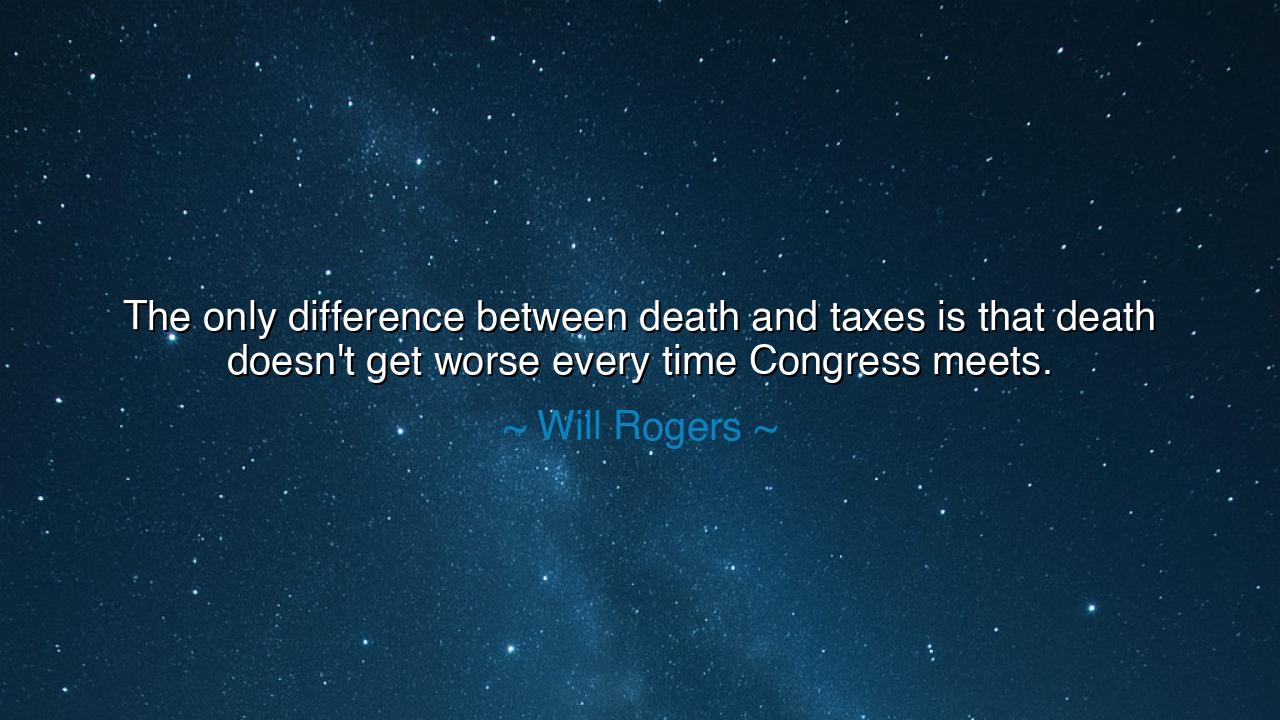
The only difference between death and taxes is that death doesn't
The only difference between death and taxes is that death doesn't get worse every time Congress meets.






“The only difference between death and taxes is that death doesn’t get worse every time Congress meets.” — so jested Will Rogers, the cowboy philosopher, the humorist whose words rode across the plains of America like arrows tipped with wit and wisdom. Beneath his laughter lay the spirit of truth, sharp and enduring. This quote, though clothed in humor, is not merely a jest at the expense of government; it is a timeless reflection on human nature, power, and the burdens of society. Rogers, with a smile on his lips, spoke the kind of truth that even the wise dare not utter without a joke to soften its blow.
The origin of this saying lies in the America of the early twentieth century — an age of expansion, optimism, and corruption alike. Rogers, born a rancher and raised among honest laborers, became one of the most beloved commentators of his time. He looked upon the growing machinery of government with both affection and suspicion. Through his newspaper columns and radio broadcasts, he observed how the people’s faith in their leaders was constantly tested by the endless cycle of taxes, laws, and political mischief. In his eyes, Congress, meant to serve the public, too often served itself — and each time it convened, it found new ways to weigh upon the shoulders of those it governed.
His humor was the language of truth wrapped in laughter. When he compared death and taxes, he was not mocking life’s necessities, but pointing to the difference between the inevitable and the man-made. Death comes to all and changes not; it is the final rest, impartial and unchanging. Taxes, however, are born from human hands, and therefore grow, twist, and multiply according to the ambitions of those who wield power. Rogers saw that every new session of Congress brought fresh promises — and with them, new levies, new complications, new burdens. Thus his jest strikes deep: death may claim us once, but taxation and bureaucracy claim us again and again.
This sentiment echoes through history. The people of every nation, from the empires of old to the republics of the modern age, have felt the weight of rulers who, though they speak of liberty, love the art of taking. In ancient Rome, the citizens once rejoiced when Emperor Vespasian found new ways to fill his treasury — even taxing the public latrines. “Pecunia non olet,” he said — “money does not smell.” Yet such wit could not conceal the truth that each tax, however clever, fell upon the common man. In time, as in every age, the people grew weary of promises that cost them dearly. Rogers, like a prophet of laughter, merely reminded his own generation of the same ancient truth: that government, if left unchecked, will always seek to take more than it gives.
And yet, his tone was never bitter. Rogers did not scorn government itself — he scorned its folly. He believed, as all wise men do, that laughter can be a mirror held up to the powerful, forcing them to see the absurdity of their actions. His humor was his rebellion, his way of calling for honesty and simplicity in public life. “I don’t make jokes,” he once said. “I just watch the government and report the facts.” In this lies his genius: he turned satire into moral instruction. His laughter was not cruelty; it was the laughter of one who loves his country enough to chide it.
What, then, is the lesson we may draw from his jest? It is this: that power must be watched, for it grows restless when unrestrained. Laws and taxes are necessary for civilization, but they must serve justice, not greed. A people who sleep while their leaders legislate will awake to find their pockets lighter and their freedoms narrower. Thus, vigilance is the duty of every citizen — not rebellion, but watchfulness; not cynicism, but responsibility. Let humor, truth, and courage be our weapons against the creeping weight of corruption.
Therefore, my listener, remember the wisdom within the laughter. When Will Rogers spoke of death and taxes, he reminded us that while death is the law of nature, taxation is the law of man — and man’s laws must be tempered by reason and conscience. Governments will always gather, Congresses will always meet, but it is for the people to hold them to account. Let us laugh, yes, but let us also learn. Let our humor not dull our senses, but sharpen them — so that we may see clearly the line between what is necessary and what is excessive, between governance and greed.
For laughter that reveals truth is a sacred gift. And in Rogers’s jest lies an eternal teaching: that those who rule must remember humility, and those who are ruled must remember vigilance. Death will come but once; taxes, many times. But through wisdom and laughter, through unity and courage, we may yet lessen their sting — and keep the spirit of liberty alive, even in the shadow of power.






AAdministratorAdministrator
Welcome, honored guests. Please leave a comment, we will respond soon